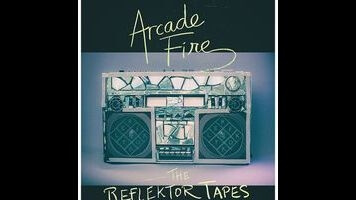It’s tricky business, speaking eloquently about your own art—that’s why so many tend to shy away from it, or stay woefully on message when they’re doing interviews. In the queasy quasi-documentary The Reflektor Tapes, the members of Arcade Fire try to have it both ways: They drop in as ghostly voiceovers that run together with impressionistic footage both live and from recording studios. The problem is that they go on philosophical strafing runs that sound impressive on the surface, but reveal almost nothing about them or the band’s music. On the decision to wear giant papier-mâché heads for parts of the Reflektor tour, singer-guitarist Win Butler says something vague about “cartoon versions of ourselves” and “communal energy,” but he lets those buzzy-sounding half-ideas just float for a second before Reflektor Tapes moves onto something else. Because there’s no interviewer extant to ask follow-ups, we’re meant to accept these quick musings as thoughtful diamonds, when in fact they’re rarely even complete, much less particularly provocative.
Add that there’s no “story” beyond that footage and those voiceovers, and Reflektor Tapes—though just 75 minutes long—drags. Your enjoyment may vary, of course, depending on how seriously you take Arcade Fire’s music: If you take it as seriously as the band does, this art project cum electronic press kit might resonate. For everybody else, it’ll likely feel unfinished, or in some ways unstarted. Not that there’s anything wrong with a band taking itself seriously, or in trying to do something unusual with the line-riding world of an official documentary. But those looking for insight should perhaps dive into Butler’s lyrics or even his in-depth interviews, because what’s here would make more sense projected onto the wall of an art museum than hanging out on Netflix.
All that said, Reflektor Tapes is ostensibly about something: the creation of Arcade Fire’s 2013 album Reflektor, which as fans already know was heavily inspired by the music and culture of Haiti. Singer Régine Chassagne’s parents were born there, and the band’s visits—including one to record part of the album—influenced its sound. While the footage of Haiti itself is compelling, the doc barely scratches the surface of why the trip felt so monumental to Chassange and Butler, beyond half-hearted nods to the country’s distinctive rhythms. There’s a scene in which Chassange is trying to get a pair of Haitian drummers to re-create a rhythm that her father used to tap on the steering wheel, and that’s charming—but it’s the closest the documentary gets to actually baring its soul, instead of just talking about baring its soul. There’s a lot of “this was really important,” and “this changed us,” but very little in the way of specifics. Maybe they couldn’t put their fingers on it, and that’s fine, but there’s no sense that they even considered digging deeper.
Still, several live performances and some powerful fly-on-the-wall moments make it tough to dismiss Reflektor Tapes entirely. Arcade Fire is in an unusual position, having risen from the ranks of the humble-at-all-costs indie underground to filling arenas with shows that go heavy on the production. In a live setting—even at a festival in Haiti, with a crowd that seems more confused than enraptured—Arcade Fire is fantastic. And there’s a great shot of Butler sitting on the studio floor, singing “It’s Never Over (Oh Orpheus).” He looks and sounds engrossed and fulfilled, and it’s a spine-tingling moment. Reflektor Tapes could have used a lot more of that intimacy, but instead it tends to build artistic, split-screen walls, throw thought-starters at them, and then duck away again.























![Rob Reiner's son booked for murder amid homicide investigation [Updated]](https://img.pastemagazine.com/wp-content/avuploads/2025/12/15131025/MixCollage-15-Dec-2025-01-10-PM-9121.jpg)

















